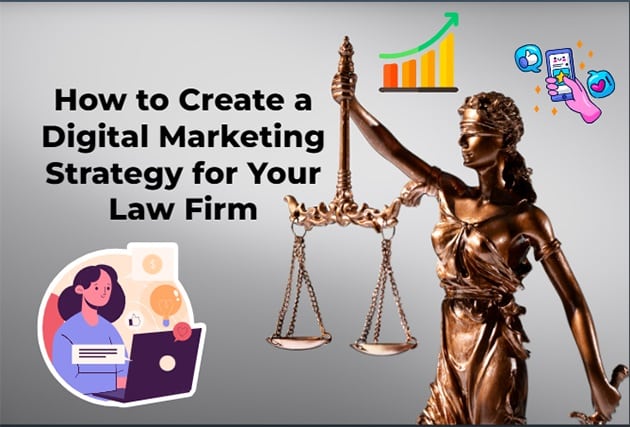The legal profession has yet to escape the sweeping online changes in today’s digital landscape. Smart clients now turn to the internet first for legal guidance, bypassing outdated directories in favor of powerful search engines and knowledgeable websites. Law firms require a carefully planned digital marketing strategy to succeed in this new normal and attract these informed prospects.
This comprehensive guide provides everything wanted to build an impactful online presence, engage new clients, and propel a practice toward ongoing success. From profiling an ideal client to maximizing social platforms and educational content, tactical recommendations cover understanding target audiences, leveraging different digital channels, and solidifying credibility as a respected legal authority online. Whether exploring content’s educational role, social media’s community-building power, or search engine optimization’s visibility boosts, following these strategic steps equips firms to conquer virtual frontiers.
What is a Law Firm?
In an era where information flows freely at users’ fingertips, the legal industry is experiencing a digital disruption. Clients are now more likely to turn to trusted online resources instead of print Yellow Pages to explore concerns, compare options, and find representation. To not just survive, but thrive in this evolving digital landscape, law firms must adopt a well-considered marketing approach that showcases their expertise wherever modern legal inquiries originate.
A Law Firm’s Guide to Digital Marketing in Conquering the Digital Frontier
Times-they is a-changin’ in the legal world. No longer are prospects solely looking in the phone book for your listing. Today, more and more people are using the internet to locate the legal assistance they need. In the Digital era, a digital marketing strategy is essential for the survival of a law firm. But where do you even begin? Well, fear not. This guide will help you understand how to create a winning client-getting digital presence.
Give me your BEST tip on Step 1: who is your ideal client?
Before scratching the surface of tactics, think it through. Who is your ideal client? What legal problems are they experiencing? Tech-savvy millennials or seasoned business vets? It is imperative to understand their demographics, online activity, and the legal needs they have. Do surveys, past client interviews, and industry reports to get a good idea of your audience.
Step 2: Creating SMART Goals for Success
Loose goals (e.g., “land more clients”) simply won’t suffice. Set SMART Goals: Specific, Measurable, Achievable, Relevant, and Time-Bound. For example, rather than having to rely on the classic “acquire more clients,” having “generate 20% more marketing qualified leads in 6 months by adding content marketing to our repertoire” is more productive. Goal Setting: Clear and easily measurable goals will keep you on track and motivated.
Step 3: Build A High Converting Website
Your website is the digital storefront of your law firm. That first impression better be a good one! Have it be user-friendly, mobile-friendly, and aesthetically pleasing. Include everything from what you specialize into your experience and contact information.
The Secret of SEO The name of the game on the internet today is SEO, which, as I understand it, stands for Search Engine Optimization.
It is the magic sprinkles for your website SEO (Search Engine Optimization). Conduct Keyword Research and Use Those Terms in Your Site Content: Use relevant keywords that are search engine friendly to increase search engine rankings and organic traffic. The higher your rating, the more likely prospective clients discover you when looking for legal aid.
Step 4: Positioning as an Authority in Content Marketing
This is the next level of (Branding) Lawyer. Be a great lawyer not just by talking but by speaking in value. Produce Quality Content – Write Blog Posts And Articles Related To Someone’s Legal Issues. Can Share About The Trends In Your Industry, Teach them about complicated legal issues, establish yourself as their legal consultant, and demonstrate your expertise.
Content Distribution – Knowledge Galore
The other half of the battle is your content creation. Get more visibility: Share with niche channels and legal directories []), [], [This works to raise awareness of your brand, illuminate traffic to your site, and establish you as a luminary in your domain.
Step 5: Social Media Marketing (Engaging Your Audience)
Social media should not be a one-way medium. It is about making great connections. The best platforms to find your ideal audience (LinkedIn, Facebook, etc.) Respond to your following, answer their questions, and share industry information and insights. ProTip: Keep it professional while highlighting your expertise.
Step 6: Pay-Per-Click (PPC) Advertising (If Required)
Opt for PPC advertising, which allows you to target specific demographics and legal issues on search engines or social media platforms. Customize your ads to capture attention and drive leads directly to your website. BEFORE WE WRAP UP, REMEMBER TO KEEP A CLOSE EYE ON YOUR PPC CAMPAIGNS TO SURE YOU ARE STILL IN THE POSITIVE.
Step 7: Trust Building via Online Reviews and Reputation Management
Online reviews are the best thing that can happen to any law firm. Ask happy clients to write testimonials on Google My Business, Avvo, etc. Answering all reviews, good or bad, fast and professionally shows that you care about your clients.
Step 8: Email Marketing- Cultivating Relationships and Nurturing Leads
Provide useful content, such as newsletters or legal updates, to gather emails from site visitors. Tailor the email list to your client’s interests, and send content about that to further fill the gaps in your funnel and stay top of mind for your nurtures.
Step 9: Analyze, Adapt, and Conquer!
In conclusion, digital marketing is not a sprint but a marathon. Keep a close eye on your website traffic, social media interaction, and the sources from which the leads are coming. This data can be used to determine what is and isn’t working. Refine your strategy and suit up for the digital chaos that never ceases to change.
Conclusion
The evolving legal landscape necessitates dynamic digital strategies for law firms. By internalizing the guidance and FAQs within this manual, you can cement an authoritative online presence, amplify new client acquisition, and propel your firm onto a trajectory of sustainable success.
Periodically evaluate outcomes, customize your approach with empiricism, and embrace progressive solutions to stay ahead of the curve. Do not shy away from the counsel of a proven digital marketing agency with legal field expertise. With focus and fact-driven decision-making, your law practice can navigate the ever-expanding virtual frontier and solidify its reputation as a dependable digital authority within the online legal sphere.
FAQs: Building Your Law Firm’s Digital Marketing Strategy
Understanding the digital landscape and crafting a solid marketing strategy is crucial for law firms to thrive in today’s competitive environment. This FAQ section addresses some key questions you might have as you embark on this journey:
What is an ideal client persona for law firms?
An ideal client persona is a detailed profile that outlines the characteristics of your perfect client. It considers demographics like age, location, and income, as well as their legal needs, online behavior, and challenges they might be facing. By understanding your ideal client (ideal client persona for law firms), you can tailor your marketing messages and content to resonate with them and attract the right clientele.
How can I set SMART goals for legal marketing?
SMART goals are Specific, Measurable, Achievable, Relevant, and Time-Bound. Vague goals like “get more clients” won’t be practical. Instead, define goals like “increase qualified leads from criminal defense cases by 30% within the next quarter through content marketing and social media advertising” (SMART goals for legal marketing). This allows you to track progress, measure success, and adapt your strategy.
What are some best practices for law firm website SEO?
Search Engine Optimization (SEO) helps your website rank higher in search results when potential clients search for legal services online. Here are some SEO best practices for law firms:
- Keyword research: Identify relevant keywords related to your practice areas and location (law firm website SEO best practices).
- Website content optimization: Use your target keywords throughout your website content, including blog posts, practice area pages, and attorney bios.
- Mobile-friendliness: Ensure your website is optimized for mobile devices, as many users search for lawyers on their smartphones.
- Backlinks: Earn backlinks (links from other websites) to your website to improve your website’s authority and ranking.
What are some effective content marketing strategies for lawyers?
Content marketing allows you to establish your firm’s expertise, build trust with potential clients, and attract organic traffic to your website. Here are some content ideas (content marketing strategies for lawyers):
- Blog posts: Address legal issues relevant to your practice area, offering valuable insights and advice.
- Articles: Publish informative articles in legal publications or online communities to showcase your expertise.
- Videos: Create educational or explainer videos on legal topics to engage potential clients in a visually appealing way.
How can I leverage social media marketing for my law firm?
Social media platforms offer a powerful way to connect with potential clients, build brand awareness, and establish yourself as a thought leader (social media marketing for law firms).
- Please choose the right platforms: Identify platforms where your target audience spends their time (e.g., LinkedIn for professional networking).
- Engage with your audience: Respond to comments and questions, participate in relevant discussions, and share industry news.
- Maintain professionalism: Remember, social media is a public platform. Uphold your firm’s professional image while providing valuable content.
Why is online reputation management important for lawyers?
Positive online reviews are critical for building trust with potential clients. Encourage satisfied clients to leave reviews on platforms like Google My Business and Avvo (online reputation management for lawyers).
- Respond to reviews promptly and professionally: Address both positive and negative reviews to demonstrate your commitment to client satisfaction.
How can email marketing benefit my legal practice?
Email marketing allows you to nurture leads, build relationships with potential clients, and keep your firm in their minds (email marketing for legal practices).
- Collect email addresses: Offer valuable content like downloadable guides or newsletters in exchange for email addresses.
- Segment your email list: Categorize it based on client interests to deliver targeted content relevant to their needs.
How can I use data analysis to improve my law firm’s marketing strategy?
Data is your friend! Regularly monitor website traffic, social media engagement, and lead generation sources (data analysis for law firm marketing).
- Analyze data insights: Use this data to understand what’s working and not in your marketing efforts.
- Refine your strategy: Continuously adapt and improve your marketing strategy based on data-driven insights.







